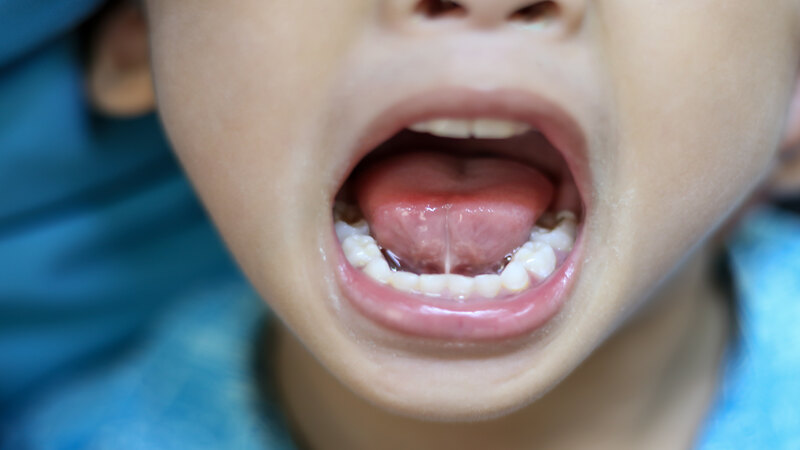
Have you noticed infants who are unable to suck properly? A toddler who shows difficulty in chewing? Children unable to lick ice cream cones like others? Or both children and grownups who are underprivileged by their poor ability to speak?
There is one underlying reason that connects all these issues – tongue-tie.
What Is Tongue-tie?
Tongue-tie or ankyloglossia is a congenital physical condition that limits the tongue’s range of movement. This can cause an extensive variety of troubles that affects the patient in several ways as the tongue is the most significant muscle that aids in speech and swallowing food. If its movement is restricted, that obviously develops eating and speaking problems. A mild tongue-tie can be easy to deal with, but a severe case may make the baby’s tongue fuse to the bottom of the mouth and making feeding a difficult issue.
How Does Tongue-tie Occur?
There is a tissue that attaches the tongue to the bottom of the mouth called lingual frenulum. Tongue-tie is said to occur:
- When this tissue happens to be too short than normal length
- If this tissue is attached too tightly to the bottom of the tongue
- When the tissue fails to move back down the tongue as in normal course. Then, the tissue will be still attached to the tip of the tongue
All the above state of affairs will restrict the movement of the tongue, leading to tongue-tie.
How Does Tongue-tie Affect My Child?
- Toddler will be unable to chew age suitable food
- Babies may experience choking or vomiting as they are unable to swallow normally and end up taking in wind inside
- Challenges identified with dental cleanliness
- Excessive drooling due to inadequate coordination of swallowing
- Delay in the development of the speech clubbed with progressively worsening the ability to speak
- Dental issues like cavities and halitosis (bad breath) happens as the food particles may not being removed completely from the mouth as the tongue is not able to swab or wipe the teeth and spread the saliva due to its restricted movement
- Loss of self-assurance since they feel and sound completely different from other children. And more often the child with tongue-tie often becomes a target for fun and bullying
- Tongue-tie possess a challenge with oral activities like playing the wind instrument, licking ice cream cones etc.
Does Tongue-Tie Affect Breast-feeding?
To some extent, yes it does. A mild tongue-tie may not pose any feeding problems, but a severe case may make it difficult for your baby to latch on the breast for feeding. She may also slip off the breast frequently and may not gain adequate weight. All this can also leave your nipples sore and painful, which could be frustrating to you and the baby both.

How Do I Know If My Child Has Tongue-tie?
If your child possesses the following symptoms you can assume he or she is having tongue-tie. However, these are only assumptions and it is strongly recommended to get the same diagnosed by the doctor.
- Inability to place the tongue past the lips
- Inability of the tongue tip to touch the palate (roof of the mouth)
- Child will face difficulty moving the tongue sideways to the corners of the mouth
- A typical feature seen in the majority of toddlers with tongue-tie is a gap the gap between the front teeth in the lower jaw and a V-shaped notch at the tip of the tongue
- When attempted to extend, the tongue tip will look flat or square instead of pointy
How Is Tongue-tie Diagnosed?
Tongue-tie can be diagnosed by simply performing a physical examination of the child’s mouth by the doctor. All the symptoms explained above will help the doctor to confirm the state of tongue-tie.
How Can Tongue Be Treated?
The treatment of the tongue-tie more or less depends on the age and extension of the tie.
If the tongue-tie affects feeding, doctors prefer to correct it right away even before the child is discharged from the hospital.
If the tongue-tie is not affecting the feeding, some doctors prefer to wait and see attitude for a short period of time allowing the child’s lingual frenulum to stretch itself. The tissue can loosen when enough time is given, sorting out the tongue-tie itself. It is found to improve by the age of three in many cases.
Surgical Treatment Of Tongue-tie?
Severe cases of tongue-tie need surgical treatment. Surgical methods are of two types:
- Frenotomy: It is a simple surgical procedure more often done with topical anesthesia (to numb the area). In this method, doctor clips the frenulum free with a sterile surgical scissors or laser. This is usually done in infants or if the extension the tie is minimal.
The baby can be fed immediately after the procedure as the procedure is quick and the discomfort will be less as there are hardly any blood vessels or nerve endings involved - Frenuloplasty: This is comparatively an immense procedure. This surgical procedure is recommended if the severity is high and additional repair is needed other than snipping the tissue or if the lingual frenulum is too thick to clip. It is done under general anesthesia. The sutures are put in which will be absorbed as the healing process go on.
During frenuloplasty, there are increased risk of infection, damage, and bleeding.It will take few weeks to a month for the wound to heal.
The toddler should undergo speech therapy after surgery
Never ignore tongue-tie of your child thinking that it will resolve in time. Once your baby shows symptoms of tongue-tie, he or she should be under constant observation of the doctor. Moreover, extend your personal attention, care, and support to your child which helps him to face this issue without feeling dejected.
